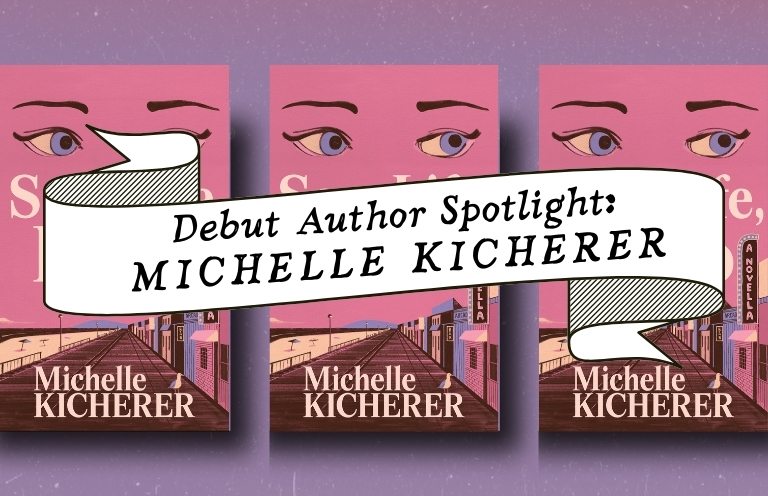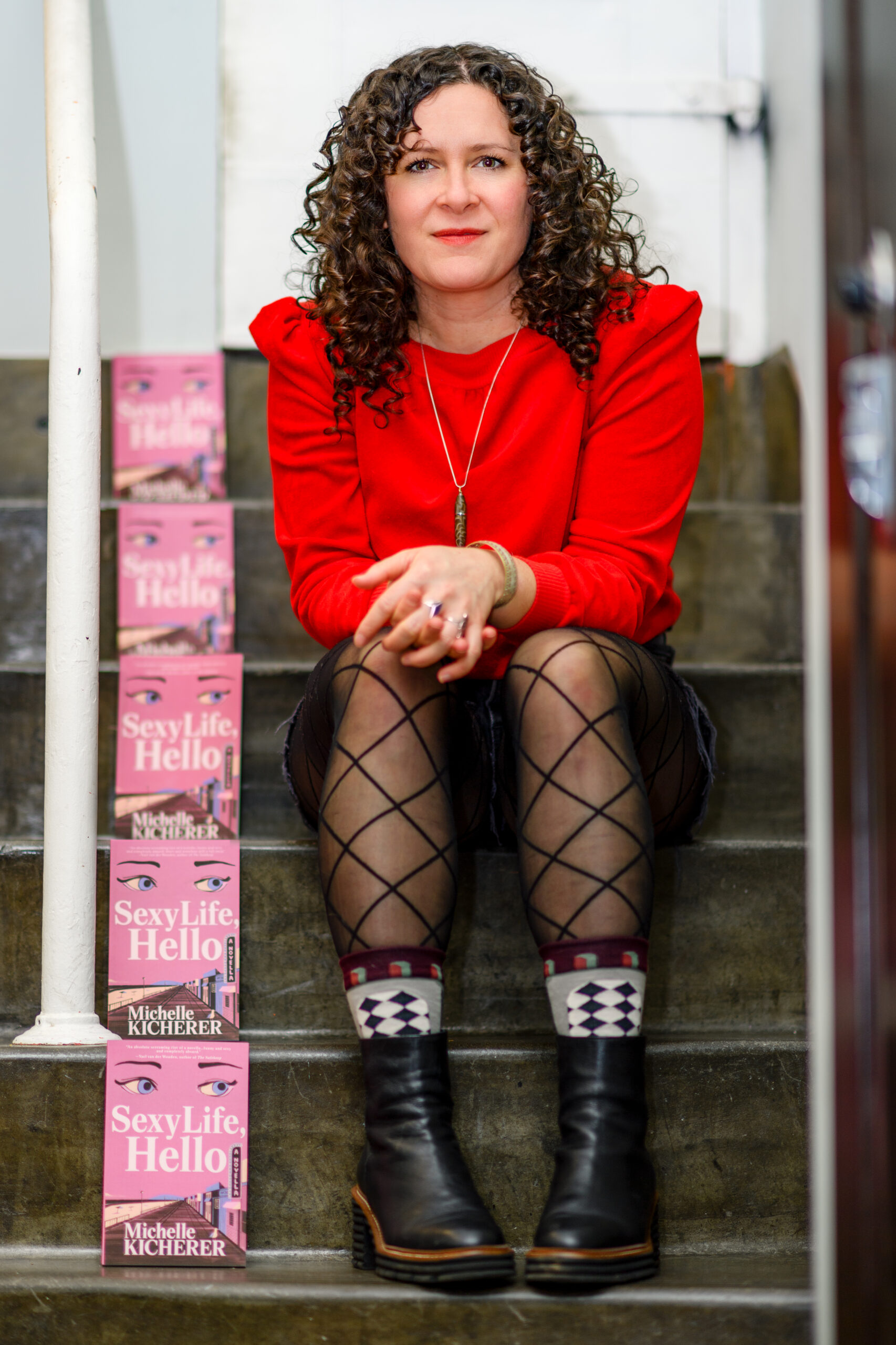Our Debut Author Spotlight series has returned! Here, past New Voices contributor Michele Kicherer discusses her non-traditional road to publication. Kicherer’s debut novella, Sexy Life, Hello, was published on March 6, 2025 by Banana Pitch Press.

I did not start out writing Sexy Life, Hello with a clear thought in mind of what it was going to be about. It started like how most of my stories start: with an intriguing plot idea.
A few years before, I’d “given up” on a novel that was based on my experience as an au pair in France. I’d spent years on it but it just wasn’t working. So, I saved it in a folder I call The Graveyard and told it that one day, I might come back for its body.
That day came in 2021.
I saw a Craigslist ad seeking a ghost-sexter for a porn star.
I’m not sure when the two ideas came together exactly, but soon after seeing that ad, I thought: Wouldn’t that be interesting, to take the nanny character and have her do this sexting job while caring for the babies? I got busy on a crappy first draft that I’d work on in bursts when I needed to take a break from the new novel I was working on at the time, which centered around art and domestic violence and dementia.
A year or so after seeing that first ad, I found myself perusing the Craigslist writing gigs section again. I found a different sexter ad. This one was much more interesting, and much more “taboo.” The porn star’s clients were into mystical kinks and kooky humor. Crippled by curiosity, I applied. They liked my application and sent back a questionnaire to test my sexting imagination.
I went wild.
I thought, If I’m gonna do this, I’m gonna do it in the way that I want—and how I’d imagine these conversations going in the book.
A few days later, I got invited to an interview with the whole sexting crew.
It was wild.
I thought, All right, if I get the job, I’ve definitely gotta do it. Both for the material and the phat stack of cash. I wound up not getting the job, but I spent the next two years reworking the initial manuscript and eventually producing a novella I was really excited by. It was weird and funny and raunchy and made me feel quite bold.
Sexy Life wasn’t the literary debut I’d imagined making. I wanted to debut with the novel about art and domestic violence and dementia that I’d poured my heart into. But that novel wasn’t quite ready at the time, and I was eager to publish a book. So, I started submitting to small presses.
That was the other thing I’d never planned on. I always thought my literary debut would be with one of the big houses. I was going to do things the traditional way: Get an agent, have them represent me, get a one or two-book deal, badda bing badda boom. I thought that small presses were not for me—and if I’m being even more honest? I thought I was “better” than that. Well, turns out I didn’t know much about the publishing industry yet.
What I did know is that novellas are fairly hard to publish on their own. Some small presses publish them, or sometimes authors include a novella in their short story collection. Occasionally, yes, bigger houses publish them but not too often, and especially not from debut authors.
Fairly quickly I got a couple of replies. The novella was longlisted by the Santa Fe Writers Project, a wonderful publisher I’d heard was great to work with from the writer’s perspective. While I waited on those results, I got an offer from a small publishing house based in North Carolina. Then another one based in the UK.
Wild!
But when it came to contract negotiations, I was disappointed. Both contracts prevented me from doing my own cover art—which was a huge deal for me. I’d always dreamed of working with Ryan Floyd Johnson, an illustrator who did the art for some of my earliest stories.
Another consideration was the audiobook. Not only did I want to perform it myself, I wanted to own the rights so I could use them for whatever I wanted, and to reap those earnings. Both contracts would make this impossible.
To help me consider my options, I interviewed writers about their experiences with presses of all sizes. One author who used to work in subsidiary rights for Penguin told me that sub rights are often where the money is. It’d be hard to find a press who’d let the author retain those. Other authors warned me that with small presses in particular, you’ll have to do a lot of your own marketing (news flash: This is often true with bigger presses, too).
Back to that idea of what the story was about. The narrator, Jane, is learning to have agency. She is becoming who she is, and learning how to be bolder, even though it’s also kinda scary. She’s doing stuff a previous version of her would have never done—and that propels her life in a direction it couldn’t have gone if she didn’t take that initial risk. How could I publish a book about taking risks without taking a risk?
Publishing industry-wise, I already had the validation that the book was “good enough.” And, luckily, I believed in it myself, too. The idea of it coming out into the world in a way that was anything less than fully and authentically My Vision did not sit right with me. So, I declined both book deal offers and withdrew my submission from its pending consideration status with several other small presses.
A few months later, I won a grant to produce my audiobook. And with that further validation, I decided to publish Sexy Life, Hello on Banana Pitch Press, the newly formed publishing wing of a nonprofit artist advocacy organization I run called Banana Pitch. We curate variety shows and radio programming with both writers and musicians. When we started back in 2014, we were a literary journal. Publishing emerging artists has always been at the core of what we do—and what better way to practice publishing our first book than with my own?
I didn’t have any capital when I made this decision, so an advisor encouraged me to run a Kickstarter to fund the basic costs of book production. Almost a hundred people donated to reach our production goal, which was incredibly humbling and exciting and again, validating. I managed everything from copyright to design to distribution to publicity and events.
A couple weeks after the book came out, I was at dinner with an old friend who pointed out all the reviews and interviews the book had earned. Press was something that he, like many folks, had associated with bigger presses. Press was something equated with the idea of success.
We pondered the question: What is success for a writer? And does anyone even care what size press the book is on?
You know what? No, most people don’t care. If they do, they’re not your people.
What I learned in this process is that the only thing the writer should care about is whether or not their book is good to them. Is the story what you want it to be? Are you proud of the writing? The ideas? If yes, then you’re successful in my book. So to speak.
 Michelle Kicherer covers books and music for the San Francisco Chronicle and Willamette Week. Her fiction has appeared in The Master’s Review, The Sierra Nevada Review, The Berkeley Fiction Review, and others, and received the Marion Hood Boess Haworth Prize in Fiction, the Leila Aba Saba Prize for Prose Writing and a Portland Regional Arts and Culture Grant. Michelle teaches writing classes in fiction and memoir and always encourages her students to get a little weirder. Her debut novella SEXY LIFE, HELLO came out March 6 on Banana Pitch Press.
Michelle Kicherer covers books and music for the San Francisco Chronicle and Willamette Week. Her fiction has appeared in The Master’s Review, The Sierra Nevada Review, The Berkeley Fiction Review, and others, and received the Marion Hood Boess Haworth Prize in Fiction, the Leila Aba Saba Prize for Prose Writing and a Portland Regional Arts and Culture Grant. Michelle teaches writing classes in fiction and memoir and always encourages her students to get a little weirder. Her debut novella SEXY LIFE, HELLO came out March 6 on Banana Pitch Press.
